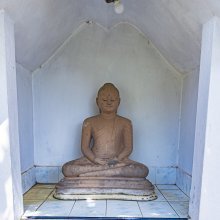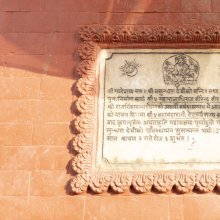Vikrama: 28 definitions
Introduction:
Vikrama means something in Buddhism, Pali, Hinduism, Sanskrit, Jainism, Prakrit, the history of ancient India, Marathi, Hindi. If you want to know the exact meaning, history, etymology or English translation of this term then check out the descriptions on this page. Add your comment or reference to a book if you want to contribute to this summary article.
Vikrama has 28 English definitions available.
Images (photo gallery)
Languages of India and abroad
Sanskrit dictionary
[Deutsch Wörterbuch]
Source: Cologne Digital Sanskrit Dictionaries: Böhtlingk and Roth Grosses Petersburger WörterbuchVikrama (विक्रम):—(von kram mit vi) m.
1) Schritt [Amarakoṣa 3, 4, 23, 143.] [Hemacandra’s Anekārthasaṃgraha 3, 473.] [Medinīkoṣa Manu’s Gesetzbuch 54.] [The Śatapathabrāhmaṇa 1, 7, 3, 23. 3, 5, 1, 1. fgg. 12, 9, 2, 5.] [Kātyāyana’s Śrautasūtrāṇi 19, 5, 15.] traya [Mahābhārata 3, 15844.] [Rāmāyaṇa] [Gorresio 1, 32, 7. 5, 1, 54. 2, 45. 5, 3.] dvitīyahari [Śākuntala 165.] [Bhāgavatapurāṇa 2, 6, 6.] Gang, Bewegung: ākūtirvikramo bāhyo mṛgatṛṣṇāṃ dhāvati [4, 29, 20. 5, 2, 8.] kāla [2, 9, 10.] Art und Weise zu gehen [Rāmāyaṇa 5, 1, 43.] su adj. [1, 1, 12.] gajendra adj. [Mahābhārata 3, 2454. 2863.] [Rāmāyaṇa 2, 23, 26.] sthira adj. [Varāhamihira’s Bṛhajjātaka S. 86, 8. 9.] pañca fünf Gangweisen habend (ratha) [Bhāgavatapurāṇa 4, 26, 2.] tvarita eiligen Schrittes, - Ganges [Harivaṃśa 3182. 4507.] [Rāmāyaṇa 7, 107, 8.] śīghravikramā [Harivaṃśa 3409. 9453.] [Rāmāyaṇa 2, 39, 12.] druta [Bhāgavatapurāṇa 4, 4, 4.] vākyaṃ samagraṃ nṛpateryathāvaduvāca cānukramavikrameṇa so v. a. anukrameṇa allein d. i. der Reihe nach [Mahābhārata 1, 7188.] —
2) kraftvolles —, muthiges Auftreten, Kraft, Muth [Amarakoṣa 2, 8, 2, 71.] [Hemacandra’s Abhidhānacintāmaṇi 739.] [Hemacandra’s Anekārthasaṃgraha] [Medinīkoṣa] [Halāyudha 4, 38. 5, 34.] [Mahābhārata 1, 5971. 7021.] labhate kṣatriyo vikrameṇa śriyam [?13, 313. Rāmāyaṇa 2, 21, 38. 3, 4, 48. 36, 13. 4, 8, 7. 5, 80, 8. 9 (pl.). Ṛtusaṃhāra 1, 14. Raghuvaṃśa 12, 87. 93. Vikramorvaśī 11, 11. Spr. 1806. 2298. 2825. 2948. 3159. 3957. Varāhamihira’s Bṛhajjātaka S. 69, 11. BṚH. 11, 9. Kathāsaritsāgara 18, 343. Bhāgavatapurāṇa 3, 11, 27. 5, 20, 6. 9, 1, 5 (pl.). Hitopadeśa 81, 4. III, 1.] nāsti vikrameṇa so v. a. dieses kann nicht mit Gewalt erreicht werden [Rājataraṅgiṇī 8, 1687.] vikramaṃ kar seine Kraft entwickeln, Muth an den Tag legen [Mahābhārata 1, 6004.] [Spr. 1046.] [Kathāsaritsāgara 12, 39.] am Ende eines adj. comp. (f. ā) [Mahābhārata 7, 8280.] [Raghuvaṃśa 3, 55. 9, 24.] [Rājataraṅgiṇī 3, 484.] dṛḍha [Rāmāyaṇa 3, 46, 10.] caṇḍa [5, 39, 24.] satya [Mahābhārata 3, 3055.] [Rāmāyaṇa 2, 72, 34.] siṃha [Rājataraṅgiṇī 6, 354.] su [Mahābhārata 7, 8224.] a [Amarakoṣa 3, 4, 27, 215.] [Kirātārjunīya 2, 15.] —
3) Intensität: chāyā (Teint) yuktā tejovikramaiḥ sapratāpaiḥ mit intensivem Glanze [Varāhamihira’s Bṛhajjātaka S. 68, 92.] —
4) das Bestehen (= sthiti Comm.): saṃplavaḥ sarvabhūtānāṃ vikramaḥ pratisaṃkramaḥ [Bhāgavatapurāṇa 2, 8, 21.] —
5) die unbetonte Silbe zwischen betonten (oder zwischen pracaya und betonter) [Taittirīyasaṃhitā] [Prātiśākhya 17, 6. 19, 1.] —
6) das Nichteintreten des krama (gramm.) [Prātiśākhya zum Ṛgveda 11, 29. Einl. 5] (= [Taittirīyasaṃhitā Prātiśākhya 24, 5]). —
7) Nichtverwandlung des Visarga in einen Ūṣman [Prātiśākhya zum Ṛgveda 13, 11.] a [6, 1. 11, 22. 14, 11.] —
8) Bez. des 14ten Jahres im 60jährigen Jupitercyclus [Varāhamihira’s Bṛhajjātaka S.8,33. fg.] [Oxforder Handschriften 331,b,5 v. u.] —
9) Bez. des 5ten astrologischen Hauses [Varāhamihira’s Bṛhajjātaka 1, 16.] —
10) Fuss [Rājanirghaṇṭa im Śabdakalpadruma] —
11) unter den Beiww. Viṣṇu’s [Mahābhārata 13, 6958.] —
12) Nomen proprium des Sohnes eines Vasu [Kathāsaritsāgara 48, 78.] = vikramāditya [Kāvya-Saṅgraha 1.] [Lassen’s Indische Alterthumskunde 2, 401.] [ 12. 15.] [TĀRAN. 3. 267.] = candragupta [Lassen’s Indische Alterthumskunde 2, 401. 947] (śrī) ein Sohn des Vatsaprī [Mārkāṇḍeyapurāṇa 118,1.] des Kanaka [Oxforder Handschriften 148,a,4.] —
13) Nomen proprium einer Stadt [Oxforder Handschriften 181,a,6.] — āvṛtya vikramam [Manu’s Gesetzbuch 3, 214] fehlerhaft für āvṛtparikramam . — Vgl. tri, bhīma, mahā, laghu .
--- OR ---
Vikrāma (विक्राम):—(wie eben) m. Schrittweite [Taittirīyabrāhmaṇa 1, 1, 4, 1.]
Sanskrit, also spelled संस्कृतम् (saṃskṛtam), is an ancient language of India commonly seen as the grandmother of the Indo-European language family (even English!). Closely allied with Prakrit and Pali, Sanskrit is more exhaustive in both grammar and terms and has the most extensive collection of literature in the world, greatly surpassing its sister-languages Greek and Latin.
See also (Relevant definitions)
Starts with (+44): Vikrama bhatta, Vikramabahu, Vikramabda, Vikramabharata, Vikramacanda, Vikramacandrika, Vikramacarita, Vikramacaritra, Vikramachanda, Vikramadaridra, Vikramadeva, Vikramaditya, Vikramadityacarita, Vikramadityacaritra, Vikramadityakosha, Vikramadityaraja, Vikramahina, Vikramaka, Vikramakarman, Vikramakeshari.
Ends with (+51): Abhivikrama, Ajitavikrama, Amitavikrama, Amoghavikrama, Ashuvikrama, Ativikrama, Atyakhandalavikrama, Avikrama, Ayatavikrama, Badhavikrama, Bahivikrama, Bahuvikrama, Bhagavata trivikrama, Bhanavikrama, Bhimavikrama, Bhujavikrama, Bhurivikrama, Candavikrama, Candravikrama, Caruvikrama.
Full-text (+267): Vikramin, Vikramarka, Suvikrama, Vikramasenacampu, Trivikrama, Vikramatunga, Vikramopakhyana, Vikramarkacarita, Vikramarkacaritra, Kalavikrama, Uruvikrama, Vikramaditya, Satyavikrama, Anantavikramin, Ajitavikrama, Vikramapati, Vikramalanchana, Vikramasthana, Vikramaprabandha, Vikramacandrika.
Relevant text
Search found 65 books and stories containing Vikrama, Vikrāma, Vi-krama, Vi-krāma; (plurals include: Vikramas, Vikrāmas, kramas, krāmas). You can also click to the full overview containing English textual excerpts. Below are direct links for the most relevant articles:
Garga Samhita (English) (by Danavir Goswami)
Verse 2.13.24 < [Chapter 13 - The Story of Śeṣa]
Verse 8.9.9 < [Chapter 9 - Lord Balarāma’s Rāsa Dance]
Verse 2.14.14 < [Chapter 14 - Description of Kāliya’s Story]
The Agnistoma Somayaga in the Shukla Yajurveda (by Madan Haloi)
Part 3.1: Construction of the Mahāvedī < [Chapter 4 - The Agniṣṭoma Ritual]
Part 3.2: Construction of the Uttaravedī < [Chapter 4 - The Agniṣṭoma Ritual]
Shrimad Bhagavad-gita (by Narayana Gosvami)
Verse 11.40 < [Chapter 11 - Viśvarūpa-darśana-yoga (beholding the Lord’s Universal Form)]
Bhakti-rasamrta-sindhu (by Śrīla Rūpa Gosvāmī)
Verse 2.3.44 < [Part 3 - Involuntary Ecstatic Expressions (sattvika-bhāva)]
Verse 2.4.130 < [Part 4 - Transient Ecstatic Disturbances (vyābhicāri-bhāva)]
Cidgaganacandrika (study) (by S. Mahalakshmi)
Verse 84 [Gurukrama] < [Chapter 3 - Third Vimarśa]
Kathasaritsagara (the Ocean of Story) (by Somadeva)
Introductory Remarks (to the Vetālapañcaviṃśati) < [Appendix 6.1 - The Twenty-five Tales of a Vetāla]
Vetāla 20: The Brāhman Boy who offered himself up to save the Life of the King < [Appendix 6.1 - The Twenty-five Tales of a Vetāla]
Related products




